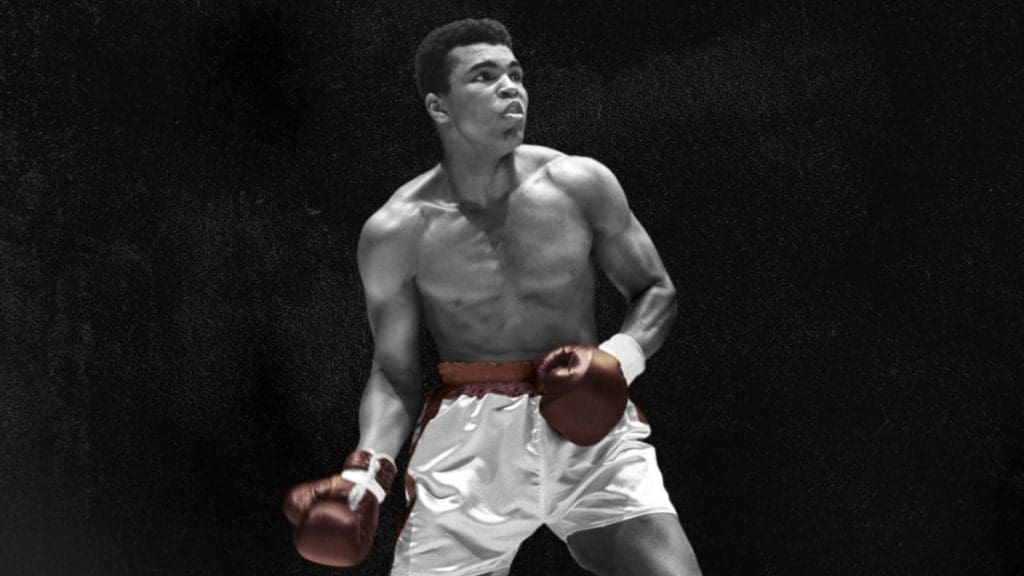
Everyone knows Muhammad Ali. The three-time World Heavyweight Champion isn’t just the greatest boxer of all time, but he may be one of the greatest athletes who’s ever lived. He was an Olympic gold medal winner, a poet, a pacifist, an outspoken advocate for black Americans during the civil rights movement and even a musician. Now, in an HBO Documentary produced by Lebron James, which premiered at Tribeca tonight, Director Antoine Fuqua’s What’s My Name: Muhammad Ali brilliantly relays the story of his career.
While the film’s 2-hour-and-45-minute runtime (to be aired in two parts) would suggest Fuqua gives a comprehensive view of Ali’s life and career, he focuses almost exclusively on the latter. The film starts in 1960, with the culmination of his amateur career, when he won the Light Heavyweight gold medal at the Olympics. Just 18 and still going by his birth name, Cassius Clay, interviews from the time already show the fast-talking confidence that made Ali so memorable outside of the ring. From there, Fuqua quickly moves into Ali’s professional career, showing him racking up wins through brief clips of the fights and a win-loss counter that appears throughout the film. It’s a tactic that keeps things moving, but it’s also one that could leave those unfamiliar with Ali’s career struggling to keep up.
To that point, it doesn’t help that Fuqua foregoes the techniques documentaries usually employ to lead viewers by the hand. There are no talking heads and seemingly no new interviews of any kind. Instead, Fuqua’s film is built by editing interviews, footage and newspaper headlines from the time to tell Ali’s story. Fuqua seamlessly shifts from Ali’s fights to his publicity tours, to his training time on his Pennsylvania estate, to his activism. Rather than attempt to examine how or why Ali converted from Christianity to Islam, Fuqua quickly moves from interviews with Malcolm X talking about the rumor of the boxer’s conversion to Ali speaking about then-head of the Nation of Islam, Elijah Muhammad. The technique can leave the viewer wishing for more context, but by exclusively using Ali’s own interviews (often playing like a voice over as various images play), he allows a man known for being outspoken to tell his own story.
That story thankfully unfolds roughly chronologically, with Ali’s first fight with Joe Frazier at Madison Square Garden as a framing device both for the individual episodes and the documentary as a whole. At first, starting both episodes with the first Frazier fight at Madison Square Garden seems like Fuqua highlighting Ali’s first professional loss or signaling it as the divider between the two phases of his career. However, as the second episode progresses, it becomes clear that he also intends to mark it as the beginning of the toll being The Greatest eventually took on The Champ.
As the first episode and the Frazier fight end, we see Ali start to rebound in the later rounds only to become as he calls it, “punch drunk,” after a devastating left hook knocks him to the ground. He gets up after, but he’s clearly dazed, his movements slower and clumsier than before. As his fourth wife, Lonnie Ali, explained in a TV interview from the ‘90s, he was different after that fight and the second half of What’s My Name largely focuses on Ali’s deterioration.
Closer to the end of his life, Ali repeatedly says he doesn’t want people to pity him or say that he should have gotten out of boxing much earlier and while Fuqua doesn’t come right out and says so, the very act of watching the greatest boxer of all time’s speech slur and slow and his movements lose their sharpness does all the speaking for him. The glorious fight record counter that seemed like a testament to superhuman strength becomes a burden, every new fight regardless of outcome dulls the brilliance of a fighter who was also so many other things.
Though Ali and his physician insisted that the Parkinson’s he was diagnosed with in 1984 wasn’t related to his boxing career, it’s difficult to believe in this post-CTE discovery world. Typical to the rest of the film, Fuqua doesn’t question that assertion, instead focusing on the philanthropy Ali performed for the rest of his life. And while sports fans and those familiar with Ali before the film starts may yearn for a film more willing to question Ali’s self-written legacy, it’s still stunning to see Fuqua, in a little under 3 hours, create a beautiful tribute to one of modern sports’ greatest athletes. And in this time in American history when real-life heroes are increasingly hard to find, there is something beautiful about watching Ali in all his arrogance and complexity make success and moral goodness seem so simple and right.

